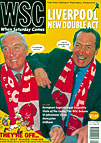 Powder puff ideas are making the dreaded Super League a laughing stock before it's even begun
Powder puff ideas are making the dreaded Super League a laughing stock before it's even begun
Be mightily afraid, there’s a super league a-coming and damned if it doesn’t keep changing shape. One day it’s going to be a midweek league involving 16 clubs, or two divisions of 16, or 20 clubs. Then it’s going to be an invitational end of season tournament running through the close season. It might be a sealed competition with no promotion and relegation, or it might be opened up to new members after the first two years.
There’s going to be a subsidiary league competition for 50 clubs, or possibly 80, organized on a regional basis, or a knockout cup. Or there could be a world league involving clubs from South America and Asia. It’s all going to start next season, or in 2000, or in ten years’ time or, help, next week.
Most terrifying was the news that the secret meetings called to discuss the league were codenamed Operation Gandalf, suggesting that the prime movers are fans of Lord of the Rings, which opens up all manner of hellish possibilities for the corporate logo.
The press are casting about desperately for clues, and not only because they have little idea of what is going on. The Murdoch titles have interests to defend in this murky business, and while they may not be entirely certain where these lie at this stage, they don’t want to encourage anything that might threaten the appeal of the Premier League, since that is almost the only thing keeping BSkyB afloat.
But they and the others have also been stuck with guesswork, because the “super” clubs won’t reveal precisely what they have in mind until they establish whether UEFA will try to head off a breakaway by restructuring the Champions League again.They are also awaiting the outcome of a meeting with officials from the European Union, which will establish whether the international football authorities would have the right to take sanctions against clubs and players who participate in an independent league.
UEFA should have held firm years ago when the European Cup was was tampered with but they didn’t, partly because as an organization they benefited hugely from the creation of the Champions League – indeed the size of UEFA’s cut from TV coverage of its own tournaments seems to be one of the prime motivations behind the clubs’ desire to run their own tournament. Similarly the FA and the Premier League are in no position to take the moral high ground in objecting to the super league when their own competition has massively widened the gap between biggest English clubs and the rest.
The saga shows the absurdities that can be thrown up by rigidly applying European law to football as if it were any other business. In this case the clubs are claiming that the control of European tournaments by UEFA is a restraint of trade, and that the governing body has no power to expel them if they were to start up their own league. Yet while the laws governing restraint of trade are intended to ensure as much competition as possible, the clear aim of the would-be breakaway clubs is to end any competition, in a purely footballing sense, by setting up a cartel for clubs which, like Milan, unaccountably fail from time to time in the genuinely competitive business of winning trophies.
“It is fun to go up and down and in and out of European cups, until you invest £40 million in salaries. Then it is not such great fun,” says Rodolfo Hecht, a former Berlusconi employee, tipped to become chief executive of the new European league. But clubs pay huge salaries out of choice, they corral together more international players than can be used at any one time in order to prevent them from playing for rivals. And now that money equals merit, players’ commercial activities determine their worth as much as what they do on the pitch. Patrick Kluivert might be valued at £9 million, but his form last season was so bad that he was booed at every home game he played for Milan.
However much you pay them, great players don’t necessarily produce great matches. As anyone who watches Channel Four’s Italian coverage can testify, games between teams of cosmopolitan millionaires are not always entertaining in a way that would hold the attention of the core market for a super league, the armchair fans who want to see a spectacle.
There is a further ray of hope for those keen to see any new competition of this kind crash disastrously. It has been reported that a European league on pay-per-view will be a cornerstone of a media conglomerate that is being formed by Berlusconi, Rupert Murdoch, Leo Kirch, a major stakeholder in Germany’s biggest media group, and a Saudi prince who is a business partner of Eurodisney and Michael Jackson.
This carries distinct overtones of the uneasy alliances periodically formed by a gang of villains in an effort to defeat Batman, which are always undermined by the inherent inability of unstable personalties to work together for a common purpose. None of the individuals named above are unstable, of course, but they may be a little muddled in the head.
A plague on them all.
From WSC 139 September 1998. What was happening this month